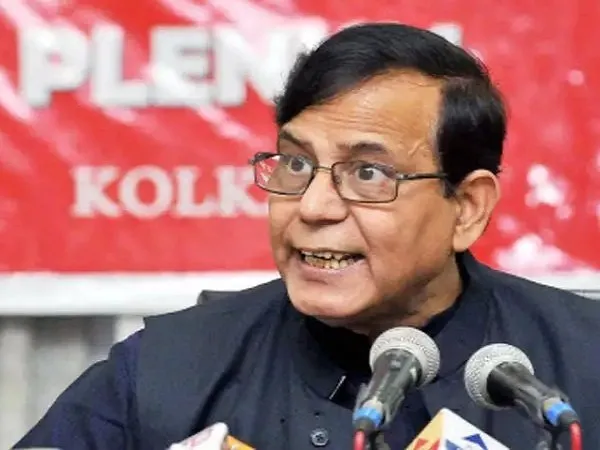West Bengal’s Murshidabad district has experienced significant violence stemming from protests against the Waqf (Amendment) Act. The clashes have tragically resulted in at least one death, left dozens injured, and led to the detention of over 100 individuals. Amidst the turmoil, the Communist Party of India (Marxist) [CPI(M)] has accused both the state’s governing Trinamool Congress (TMC) and the Bharatiya Janata Party (BJP) of worsening communal discord in the area.
The demonstrations, which started on Friday subsequent to the Waqf (Amendment) Bill’s approval in Parliament, escalated violently across several locations within the district. On that Friday, police action involving gunfire against protesters in Suti resulted in critical injuries to 21-year-old Ijaz Momin. He later died at Murshidabad Medical College and Hospital on Saturday evening. Three other individuals injured during this incident were hospitalized in Jangipur.
To date, authorities have arrested 118 people in connection with the disturbances. The violence has caused injuries to more than twelve protesters and a minimum of fifteen police officers. In response to the situation, the Calcutta High Court has mandated the deployment of central security forces in Murshidabad until the following Thursday to help preserve order. Chief Minister Mamata Banerjee has issued a plea for peace, assuring residents that the contentious Waqf law will not be put into effect in West Bengal.
TMC blames BJP and BSF
Trinamool Congress leader Kunal Ghosh asserted on Monday that the communal violence in West Bengal’s Murshidabad stemmed from a conspiracy. He implicated certain factions within central agencies, the Border Security Force (BSF), and two to three political parties in orchestrating the unrest, which occurred during anti-Waqf Act protests and resulted in three deaths.
Ghosh described these events as “some bad incidents,” claiming that provocateurs entered the district, caused turmoil, and were then allowed to leave without consequence. He appealed for public calm and restraint. “We are receiving some inputs that there was a larger conspiracy behind those incidents (Murshidabad violence). Some sections of central agencies, a section of the BSF and a section of two or three political parties were involved in this conspiracy. With the help of a part of the BSF, there was a gap in the border. Some miscreants entered, created chaos and were given safe passage to return. I use the words ‘border’ and ‘with the help of a section of BSF’. Whether it is true or not, there is a need for proper investigation,” he said.
Congress counters
West Bengal Pradesh Congress Committee President Subhankar Sarkar asserted that the ongoing mob agitation and violence within the state concerning the Waqf Bill’s passage by Parliament result from deliberate efforts by both the governing All India Trinamool Congress and the opposition BJP to foster political polarization with the aim of influencing next year’s assembly election outcome. “The ongoing agitation and violence in West Bengal is part of politics aimed at polarisation in the run-up to next year’s West Bengal assembly election. Both the ruling TMC and BJP are part of this binary politics. I condemn this violence and appeal to the people to maintain peace and communal harmony,” Sarkar said.
CPI(M) Alleges Political Manipulation Behind Violence
During a press briefing, CPI(M) West Bengal Secretary Mohammed Salim attributed the violence to both the TMC and the BJP. He stated, “One group favors rioting, another opposes it. In Murshidabad, BJP and Trinamool are engaging in riots together, while the Left Front and Congress are striving to quell the riots.”
Salim specifically pointed to TMC’s Humayun Kabir and BJP’s Karthik Maharaj as figures allegedly inciting the trouble. He further called for the arrest of BJP leader Suvendu Adhikari, accusing him of being the “mastermind” orchestrating the violence.
CPI(M) Reports Deaths of Workers Trying to Prevent Riots
Salim also denounced the killings of Haragobinda Das (72) and his son Chandan Das (40) in Samserganj on Saturday. Described as CPI(M) sympathizers, they were reportedly hacked to death. According to the party, the two men were attacked while attempting to prevent rioters from looting their neighborhood.
“They sacrificed their lives not for religious reasons, but to halt the violence,” Salim commented after meeting the grieving family. A statement released via the CPI(M)’s official Facebook page mentioned that villagers and the family reported a lack of police presence in the vicinity when the incident occurred.
Conflicting Accounts: Locals Dispute Link Between Murders and Protests
Despite the CPI(M)’s claims, local leaders involved in the anti-Waqf Amendment movement informed Maktoob that the murders of the father and son were not related to the protests, although they strongly condemned the killings.
BJP Claims Hindus Being Targeted
In reaction to the unrest, the BJP has begun a political campaign centered on the assertion that Hindus are facing targeted attacks in West Bengal. This narrative has further fueled the political finger-pointing surrounding the communal flare-up in Murshidabad. Leader of Opposition Suvendu Adhikari Suvendu Adhikari, made allegations on concerning the situation in Dhulian, Murshidabad. He claimed that due to communal tension, over 400 Hindus had been forced to leave their homes in the area. This statement from Adhikari came after central paramilitary forces were dispatched following recent incidents of violence. He implicated the ruling Trinamool Congress in the events.
The situation remains tense, with political leaders exchanging accusations while authorities focus on restoring normalcy to the affected region


